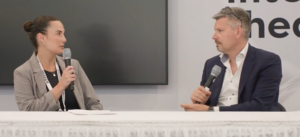BioProcess Insider Interview: Emmanuel Ligner, Chief Executive Officer, CytivaBioProcess Insider Interview: Emmanuel Ligner, Chief Executive Officer, Cytiva
August 21, 2023
Sponsored by Cytiva

Millie Nelson, Editor, BioProcess Insider (left); Emmanuel Ligner, Chief Executive Officer, Cytiva (right).
Cytiva created its Biopharma Resilience Index about three years ago during the COVID-19 pandemic to better understand industry needs and trends. According to Ligner, the most recent survey asked about 1,250 executives at biopharmaceutical companies about how they rate the resilience of the industry in five important categories: supply chain, research and development (R&D), manufacturing agility, regulation, and talent.
The feedback that Cytiva has received enables it to assess industry needs on a global scale. The data also inform the development of regional business strategies. Ligner credited customer feedback with encouraging Cytiva’s merger with Pall, which, he said, has eased and enhanced ordering and customer-service experiences.
Results from the most recent survey showed that supply-chain resilience was low at the heart of the pandemic but has improved steadily and is now on a better trajectory. Cytiva plans to leverage its recent merger with Pall to improve its services and deliver capital to regions with the greatest need for supply-chain recovery.
Conversely, government regulations that showed flexibility during the pandemic have gotten more stringent. The resilience index shows that drug developers are having a harder time managing regulatory requirements for their pipeline products. Ligner expressed hope that regulators would read the results of the index and help bring flexibility back to companies that need it. Additionally, the index highlighted customers’ growing demand for sustainability, which has driven Cytiva to build regional facilities to replace large centers of production that were originally designed to serve the entire world. Although Ligner acknowledged that large-scale change takes time, he said that the company is currently building a chromatography manufacturing site in the United States.
Notably, the index showed an increasing shortage of workers who can fill industry jobs requiring special expertise. Ligner said that the problem is due not only to industry growth, but also to industry evolution. It is now important to attract workers with expertise in digital skills, which historically has not been a hiring priority. Companies should seek out candidates who can use the digital tools that are revolutionizing the industry, such as in silico simulation and digital twins.
Solving the talent problem will take time and outreach. Ligner said that to bring more scientists to the industry, companies must reach high-school students to cultivate a passion for science and to demystify scientific careers. Citing his commercial background as an example, Ligner emphasized that many industry jobs occur outside of laboratories, requiring expertise in fields such as law, business, and accounting.
Fill out the form below to view the full interview now.
You May Also Like





